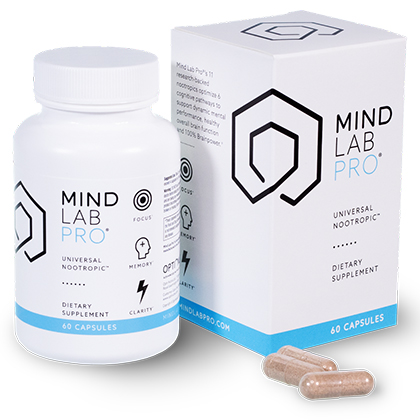Acetylcholine is essential for proper cognitive function, and a deficiency can cause many problems. Research shows that low levels of acetylcholine are connected with Alzheimer’s and Parkinson’s disease, dementia, and other forms of cognitive decline.
Low acetylcholine levels may also cause poor mood, anxiety, gastrointestinal problems, and an inability to focus. However, there are plenty of natural ways to increase acetylcholine production in the parasympathetic nervous system.
You may find that increasing acetylcholine eliminates brain fog, improves memory, and can reduce symptoms of various mental health conditions.
Let’s look at the best ways to boost acetylcholine levels.
Mind Lab Pro is the best acetylcholine supplement that enhances every aspect of mental ability, from improving memory and brain function to boosting concentration.
Contents
1. Eat Foods That Contain Choline
Choline is an essential nutrient and a precursor to acetylcholine (ACh). Therefore, it is necessary for healthy adults, and we must eat adequate amounts to maintain adequate levels of the neurotransmitter.
But many people do not consume enough choline for sufficient choline levels, and because of that, our brain often becomes deficient in acetylcholine.
The good news is that there are plenty of tasty foods that are rich sources of choline to choose from. It is best to select many foods from a variety of food groups as well.
Eggs are rich in choline, and it is easy to add them to your diet. Organ meat, like beef liver, is another food rich in choline, but also regular meat like turkey and chicken also contain high amounts of this essential nutrient.
Fish, especially fatty fish like salmon or caviar, is another one of the best food sources that you can eat to boost acetylcholine.
In addition to these foods, various fruits and veggies contain sufficient choline to increase acetylcholine levels.
Cruciferous vegetables like broccoli and brussels sprouts have substantial amounts. So do mushrooms, beans, potatoes, nuts, and soybeans, as well as blueberries, spinach, and bananas.
Also, the caffeine found in coffee or tea may affect the neurotransmitter’s release and promote its function properly (1).
Healthy choline-based diets are only beneficial if you consume foods from all categories to have a well-balanced diet for human health. This increases choline levels while ensuring well-rounded nutrition and consuming all valuable nutrients for optimal brain health.
2. Take Choline Supplements
Another option for how to increase acetylcholine is choline supplementation. Since choline is an essential nutrient and one of the building blocks required to produce the chemical messenger ACh, there are plenty of supplements to choose from to boost levels of choline.
One of the most prevalent compounds for supplementing choline is L-Alpha-glycerylphosphorylcholine (Alpha-GPC).
This is a form of choline that readily passes through the blood-brain barrier and is one of the most effective choline supplements, so much that it is used to treat Alzheimer’s disease in Europe, and more and more researchers are touting the benefits (2).
Another option that shows promising effectiveness is Citicoline (CDP-Choline), a natural substance found in the brain, a precursor that increases acetylcholine levels and improves blood flow for brain function.
The best citicoline supplement sells under the brand name Cognizin as it has higher bioavailability than other forms. While there are many great supplements to raise acetylcholine levels, but some options are not as effective.
For example, choline bitartrate is the standard choline-based supplement, but there is little evidence of research showing that it provides more choline. This is likely because it does not cross the blood-brain barrier to produce the cognitive neurotransmitter.
3. Use Acetylcholine-Boosting Herbs
Several herbal supplements can help in raising acetylcholine levels. One herb with proven outcomes to help is Bacopa monnieri, a natural adaptogen used as a component of traditional Chinese medicine.
It works to balance neuro-communicators like dopamine and serotonin, besides acetylcholine. Research shows that Bacopa can boost verbal memory and learning, reduce stress, and improve mood (3).
Another option is Ginkgo biloba, which many believe in having a cholinergic activity that activates acetylcholine receptors (4).
This can help with processing speed, cognitive function and significantly stimulate mental energy. It also has anti-inflammatory and antioxidant properties to slow aging and memory loss.
American Ginseng is another choice that can help with acetylcholine synthesis. Since acetylcholine plays a significant role in myasthenia gravis, it may be a potential treatment opportunity.
In addition, American Ginseng enhances focus and mental capacity by boosting acetylcholine. People commonly like to combine ginseng with Rhodiola rosea to improve the state of mind and fatigue (5).
Finally, Huperzine A is another herbal option, a compound extracted from the Chinese club moss Huperzia Serrata.
Huperzine A can contribute to the formation of new memories as it can block the enzyme acetylcholinesterase that aids with acetylcholine breakdown.
Gotu Kola is the last alternative that aids with the breakdown of acetylcholine, and many people take Gotu Kola with Huperzine together to enhance the effects.
4. Get Vitamins and Minerals
Some vitamins can increase choline intake and are responsible for regulating the availability of acetylcholine.
While many people may get enough of these compounds from diet alone, several studies show that higher levels may be better for increasing acetylcholine.
B-Complex vitamins are necessary components, especially Vitamin B5 (pantothenic acid). Choline uses B5 in the process to convert choline into ACh (6). This can lead to a better release and could significantly increase acetylcholine levels and production.
B Vitamins are combined with supplements to maintain a regular choline intake and maintain neurons and nerve cells.
Acetyl-L-Carnitine is an amino acid and quasi-vitamin that can be helpful in increasing acetylcholine levels in the hippocampus by activating the receptors in the brain.
Human studies show that L-carnitine can significantly improve cognitive health and increase energy levels and attention span (7).
However, the results found with this substance are rarely produced with the first dose, and it may take long-term ingestion to reduce stress on the brain and body to improve overall human health.
Finally, Vitamin D that we get from the sun or in supplement form can increase choline acetyltransferase activity (8).
This can help with sleep, insomnia, cognitive functions, muscle cramps, and depression. Most people get enough by going outside during the summer but may experience reduced amounts during the winter months.
5. Exercise Regularly
We all know that exercise is good for physical health, but it can also influence the brain’s health.
While less acetylcholine could occur during strenuous activity, other studies show that working out has a tremendous impact on the progression and breakdown of acetylcholine (9).
In addition, the chemical transmitter also offers benefits to skeletal muscle because it is necessary for muscle contractions.
Therefore, not only does physical training help to increase acetylcholine, but it can also make it easier to contract muscles, possibly aiding with muscle recovery and preventing injury.
Exercise can be good for overall well-being, and an active lifestyle can raise levels of many chemical messengers besides ACh.
In addition, because of the ability to inhibit high levels of neurotransmission, exercise is critical for promoting a positive outlook.
Conversely, an acetylcholine deficiency can significantly reduce muscle tone and may even cause an inability to control muscle contraction properly.
The combination of exercise on the body and ACh on the brain may even help with the brain’s plasticity or improve the likelihood of restful REM sleep. This is because this stage plays a key role in information processing.
6. Practice Yoga and Meditation
Yoga and meditation can be great for reducing tension and eliminating stress.
One study found that meditation can help with acetylcholine synthesis and improve ACh neurotransmitter concentration in the frontal lobes, which may be an essential factor in the beneficial actions (10).
Furthermore, yoga combines this benefit of meditation with physical exercise, which may work even better.
This makes the impact on the brain even more substantial while simultaneously being great for the body. Yoga may even abolish anticholinergic qualities that block acetylcholine.
Meditation can calm the body and ease the mind while boosting well-being and outlook.
It can release endorphins and serotonin besides ACh, and some researchers claim it is as beneficial as prescribed medications for mental health.
While it can take some training to meditate, it is not very hard to get started. You may even notice that you feel much better after 5 to 10 minutes of meditation per day.
Yoga and meditation can get rid of symptoms associated with low levels of acetylcholine, like headaches, fast heart rate, and nausea, as well as behavioral symptoms like stuttering, confusion, or irritability.
Conclusion
Acetylcholine offers mechanisms for many essential purposes, including learning, memory, concentration, and gastrointestinal processes.
Having too little ACh can be detrimental to your cognitive abilities, make it harder to focus, and harm mental clarity.
There are plenty of natural methods to increase acetylcholine in the brain. Changing your diet to choose foods high in choline, exercising often, and practicing meditation can all help, but sometimes that is not enough.
It may be best to take herbs or acetylcholine supplements to boost the needed levels when that is the case.
The best supplement available for increasing acetylcholine is Mind Lab Pro. This natural product aims to influence neurotransmission in the brain and offer well-rounded results using only synergetic ingredients.
Choosing to take a supplement along with changing lifestyle could have a massive sway on well-being.
If you are looking for a powerful supplement for acetylcholine support, look no further. Mind Lab Pro has been proven to boost alertness, brain health, and working memory effectively.


